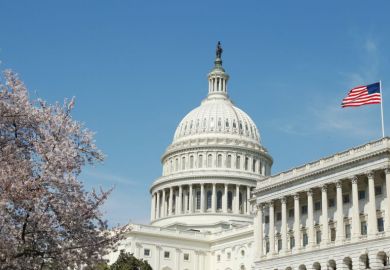US colleges scored just $14 billion (£11 billion) from a multitrillion-dollar economic rescue measure approved by Congress − and quickly warned of dire budgetary pressures and a possible easing in their opposition to reopening.
The $2.2 trillion bill, meant primarily to boost unemployment benefits, hard-hit industries and healthcare providers nationwide, offers more than $6 billion in student aid and about $7.5 billion for institutions.
That institutional aid is less than the $8 billion that colleges and universities are already spending just to refund room and board charges for the current academic year, according to the American Council on Education, the main US higher education lobby group.
“It’s nowhere near the resources needed,” said Terry Hartle, senior vice-president for government and public affairs at the council, which has estimated sector-wide losses of $50 billion even if classes resume in the autumn.
Public institutions are especially concerned, the Association of Public and Land-grant Universities said, because state entities remain excluded from tax credits for paid employee leave that the private sector was given in the previous relief bill.
Early signs of trouble are already popping up. The San Francisco Art Institute, long struggling to survive in a difficult field, has announced it will close after 150 years and numerous renowned graduates.
Quinnipiac University and LIU Post, the largest campus of the private Long Island University, have begun layoffs. Central Washington University, a public college, has declared financial exigency, meaning it is likely to lay people off as well.
More than a week ago, Dr Hartle said the most valuable action the federal government could take − even more urgent than financial aid − would be an all-out assault on the spread of Covid-19.
The government’s commitment to that remains in doubt, however, as the US has taken the global lead in confirmed Covid-19 infections and President Trump has expressed an eagerness to end the economically punishing “social distancing” behaviours pursued by governors across the country.
A few US colleges, mostly those serving conservative communities, are considering testing those boundaries, said Jo Ellen Parker, a former president of Sweet Briar College now serving as vice-president for communications at the Council of Independent Colleges.
The most overt is Liberty University, a Christian-focused private institution in Virginia that allowed students back on campus this past week and reported that 1,700 of its 15,000 on-campus students had returned. The state’s Democratic governor criticised the move but did not forbid it.
And desperation across US higher education over cost-benefit calculations may be broader than just Liberty. Dr Hartle signalled that by declining to fault Liberty on behalf of his association, even after his own calls earlier this month for a dedicated government assault on the spread of Covid-19.
“If schools feel they can protect the health and safety of the students, they may well reopen,” Dr Hartle said of Liberty’s move. He noted that US colleges were accused of overreacting when they began closing in early March. “So I think there will always be people who will second-guess any decisions that organisational leaders make in times of great uncertainty,” he said.
The money for colleges in the bailout bill represented a significant improvement over earlier versions, which first included no direct aid to colleges and students before climbing in subsequent legislative drafts to $6 billion and eventually the $14 billion.
Lawmakers crafting the bailout rejected provisions to relieve existing student debt, although the Trump administration has moved separately to block related collection actions and wage garnishments.
And colleges remain hopeful of more aid in yet another relief measure, Dr Hartle said. “Congress in this bill didn’t look very carefully at education,” he said.
Register to continue
Why register?
- Registration is free and only takes a moment
- Once registered, you can read 3 articles a month
- Sign up for our newsletter
Subscribe
Or subscribe for unlimited access to:
- Unlimited access to news, views, insights & reviews
- Digital editions
- Digital access to THE’s university and college rankings analysis
Already registered or a current subscriber?







